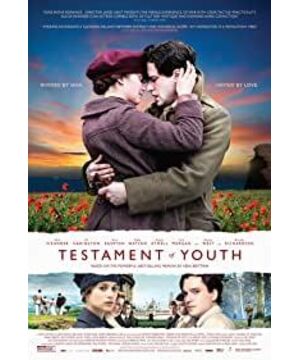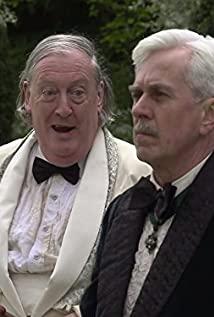The story began in the spring of 1914, when everything was still beautiful. The daughter of a wealthy family, Vera, was eighteen years old, beautiful and intelligent, and had a strong relationship with his younger brother Edward. What worries her most is that although her parents love her and hope that she will find a wishful man soon, she also wants to go out to study like her brother. How to work hard and soft with her brother and persuade her parents to let her go to Oxford is a big problem for her wholeheartedly.
During the holiday, the younger brother brought his friend, proud Roland. And the gentle Victor is a good friend of his siblings since childhood. Four young people wandering in the plains of the English countryside, full of rippling lakes, towering trees, fingers that drew the tip of the soft grass, reserved skirts, they were laughing, frolicking, talking about poetry and art, Some fell in love, some silently guarded.
At this point in the movie, youth, sunshine, love and beauty are laid out. They are all children of good people. They all have a good future. Vera finally entered Oxford. However, the beauty has come to an abrupt end. In August 1914, the United Kingdom Germany declared war and the boys were enlisted.
Then they all died.
Vera lost all the boys she loved. Fiance, brother, friend.
Although she interrupted her studies to become a volunteer nurse. Although she comforted the soul of his fiance Roland who was ransacked by the war. Although she rummaged through the wounded soldiers and saved the life of her brother Edward. Although she proposed to her blind friend Victor with infinite tenderness-she knew he had always loved her.
They are still dead.
In the movie, there was a segment that moved me very much. Even when Edward enlisted in the army, the young people were still so energetic, and Vera and Edward's father, who had always been the head of the family, cried, crying as if he was broken.
The adults know what the battlefield means.
Now, when we first arrive in Europe, one thing we will be surprised is that they attach so much importance to the memorial of the First World War. It’s no wonder that in most of our people’s minds, World War II is still empathetic, while World War I is a distant war that took place in a distant place. And Europe is this remote place itself. This war was originally called the "European War". The eternal flame of the Arc de Triomphe in France was originally lit to commemorate the unnamed soldiers who died in World War I.
This unprecedented scale of war has shaped the world we live in today, and it can be said to be a watershed between the so-called old era and the new era.
Before that, the world was still in that reserved old age. Europe had stabilized for a hundred years. People marveled at the achievements of the industrial revolution and enjoyed the convenience brought by science and technology, but life was still so clear and classy. People's attitude towards war is still traditional. Fighting for my king is an honor, even an honor exclusive to the nobles. Loyalty to the emperor and patriotism is a matter of course, and the battle to death is the work of heroes. Few people have questioned these.
After the start of the First World War, it was originally a local war in Europe, but because of its interests, the whole world was engulfed. After that, the inherent classical political and economic system was unsustainable, countless elites were buried in the battlefield, classes fell apart, and the rapid advancement of science and technology finally shaped a new era that has continued to this day. Almost all the patterns, disputes, and problems in the world today, such as the advancement of workers, women, and blacks, the demise of the gold standard, the rise of the United States, and the Middle East issues can be traced back to the First World War. The war disrupted the original distribution of benefits. Speeding up the struggle for new interests.
In the First World War itself, heavy machine guns and tanks were put into actual combat on a large scale for the first time. In a battlefield like a meat grinder, 70 million people fought each other and 10 million people died. As Churchill said: "The spirit of chivalry has disappeared from the battlefield. It has become a place of mere killing." The more soldiers who came from nobles pursuing honor, the higher the death rate. In the end, no one can tell the significance of this world war, and the soldiers, the young men who were supposed to be sons, husbands, and fathers, lost their lives in vain.
Those who survive, endure the pain of losing their beloved ones, and have to reflect on the war. This is how modern anti-war thinking came into being. Regardless of whether it is famous or not, whether justice is in hand or not, it opposes all forms of violent war-peace, not war.
In the UK, around the annual Remembrance Day (November 11), almost everyone wears poppy-shaped brooches. These brooches are sold by the Royal Veterans Association. All funds are used to rescue veterans and veterans. His family.
Why wear poppies instead of other flowers? There is a story in between:
In 1915, the First World War was in full swing. Canadian military doctor Lieutenant Colonel John McRae witnessed the death of his comrades in Flanders on the border between Belgium and France. Witnessing the poppies blooming in the mountains and plains seemed like the blood of soldiers, he wrote the famous poem "At the Battlefield of Flanders" in the tone of the dead:
On the battlefield of Flanders, poppies
opened in the wind and opened between the crosses. , Line by line
marking the place where our souls are broken, the
skylark still sings, spreading wings in the blue sky,
but you can’t hear it, because the guns are blaring on the battlefield,
we are dead, just a few days ago
we had life, bathed See also the dawn of a bright sunset
we also love are loved, but now they rest in
Flanders fields
continue to fight the enemy and it
trembling hands thrown to you
that flaming torch, it will let you hold high
if you live up to our dead
we Will not rest in peace, even though poppies
dyed red on the battlefield of Flanders
the poem was published in the British magazine Punch, it spread widely and became the most famous poem during the First World War. It is precisely because of this poem that the poppies became a memorial flower for the soldiers who participated in the First World War, and later extended to the memorial of all the soldiers who died.
Several Commonwealth participating countries outside Europe, such as Canada, Australia, and New Zealand, commemorated the soldiers who died in World War I even more than Europe. In Canada, the poppy brooch is also a must-have souvenir.
On the cover of the original book "Vow of Youth", there is a shocking poppy.
In the movie poster, there is also a field of poppies in full bloom.
At the end of the movie, when the vivid figures disappeared, as if they walked into a sea of poppies and could never come back.
In reality, Vera, after resuming his studies after the armistice, decided to record the story of their generation, and later became a famous anti-war activist.
——The best memorial to war is not a flower like blood, but never launching a war again.
Thank you for watching. I'm Shanshan cat, the cat editor of Mao Ka. Our aim is to know the book well, play things and
lose ambitions ~ ~ WeChat public account: mockupcoffee / cat's coffee roaming
know almost column: cat's coffee roaming
View more about Testament of Youth reviews











